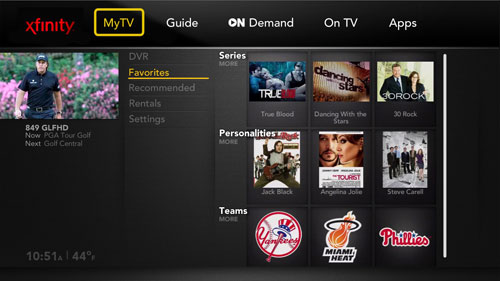 Comcast, which has remained the traditional alternative against the growing Internet TV trend, is now jumping on board with online entertainment. The nation’s largest cable provider announced on its blog yesterday that it is involved in a new project called Xcalibur, “where the goal is to take everything we’ve learned from the web and tablets and bring it right back to your TV screen.”
Comcast, which has remained the traditional alternative against the growing Internet TV trend, is now jumping on board with online entertainment. The nation’s largest cable provider announced on its blog yesterday that it is involved in a new project called Xcalibur, “where the goal is to take everything we’ve learned from the web and tablets and bring it right back to your TV screen.”
From the sounds of it, Xcalibur is Comcast’s go at beating smart TVs at their own game. The platform will use the company’s own technology and cloud servers to stream TV via Comcast’s network using IP standards. Comcast says this will allow its subscribers’ television experience to become more personalized, and that it will also allow it to provide users with apps and social integration. It won’t stop there: “As a network-based entertainment experience, the rich TV navigation and services will eventually carry over to many other TV devices including connected TVs and game consoles.”
Comcast is currently testing the service in Georgia, but this technology has far bigger potential that the network plans to make a reality. Comcast is developing a system to provide its channels, including live television, via IP, as well as the ability to stream Internet content to the TV. If this sounds familiar, that’s because that’s what services like Hulu and Netflix do – with one huge difference: Live programming. A significant caveat to these types of Comcast-replacements is that you give up the convenience and novelty of live television (as well as, often, access to major broadcasters), but given the mild abandonment of traditional box tops and even TV sets, there are many people willing to make such sacrifices. Comcast currently delivers its programming using technology that is not compatible with the Internet, but that’s about to change.
The Wall Street Journal reports that Comcast will soon begin testing this service at MIT, with a long-term goal of enabling its customers to watch live television on anything that has an Internet connection – tablets, computers, gaming consoles. Comcast is undoubtedly aware of how many streaming services are currently dominating this platform, but as the largest cable provider in the country, it has a large pool of potential users to draw from. “We want to deliver video everywhere people want to watch it,” Comcast’s President of Converged Products, Sam Schwartz, told WSJ. “We have to do a better job getting people to realize what they are paying us for.” Comcast’s old school method won’t be abandoned, but if all goes according to plan the provider will add the IP-programming system to its cable services. This also means the provider can start reaching out to consumers outside of its coverage, so long as they have Internet access.
So here’s the good side: Comcast customers who want to cut the cord but can’t justify losing the privileges that come with this coverage will now have the option to rely on their Internet connection for live programming and Comcast channels. It could also be assumed that much of the TV content that major networks have pulled would be available (eventually – Comcast’s working on that), although this means Comcast’s option would likely cost more than Hulu or Netflix. But if you’re a Comcast customer who wanted to switch to Internet-only broadcasting, you’d have the choice and could stick with your current cable provider. Not to mention that Comcast customers who’ve exhausted OnDemand services would be thrilled to have the mass amount of extended content available on their television set – not only on a laptop, tablet, computer, phone – on the TV, which has been proven to be where (surprise!) most people want to watch the stuff.
And here’s why it’s bad: Comcast has enough power as is. Having the ability to glean formerly out-of-range customers from its competitors (who, it must be mentioned, are largely also massive companies) would give Comcast some serious advantages. It currently alludes that it has no plans to do this, but now that an Internet connection is all you need, it would be possible.
There’s also something to be said for competition. Comcast still has a stranglehold on television, despite the progress Internet streaming has made. Even with its growing popularity, plenty of consumers remain committed to the cord. By offering something like this, the likes of Netflix, Hulu, and YouTube (which has its own programming aspirations) are facing an uncertain future. These services would have serious trouble competing with Comcast’s resources, like distribution rights, data centers, and general infrastructure.
But conclusions can’t be drawn yet. Comcast is facing a slow implementation of any IP-TV services, largely because content providers still aren’t on board with licensing. Until this fully-featured connected option, we’ll have its Xcalibur service to tide us over. The Georgia trial of the service should wrap up in the near future, and then we’ll likely get a more thorough look at what’s to come: Features like basic web functions, customization, an updated programming guide with search abilities, some online streaming options, and social media integration with sites like Twitter and Facebook. This “Internet TV-lite” service should be available starting next year.
Editors' Recommendations
- Hulu Live vs. YouTube TV: How to pick the best live streaming service
- Netflix vs. Hulu: Which one is better for you?
- Comcast adds Hulu to Xfinity Flex and X1 as social distancing ramps up
- 2020 Golden Globe nominations were big for Netflix, Apple TV+
- Netflix built a TV empire without ads. Here’s why it’s time to consider them


